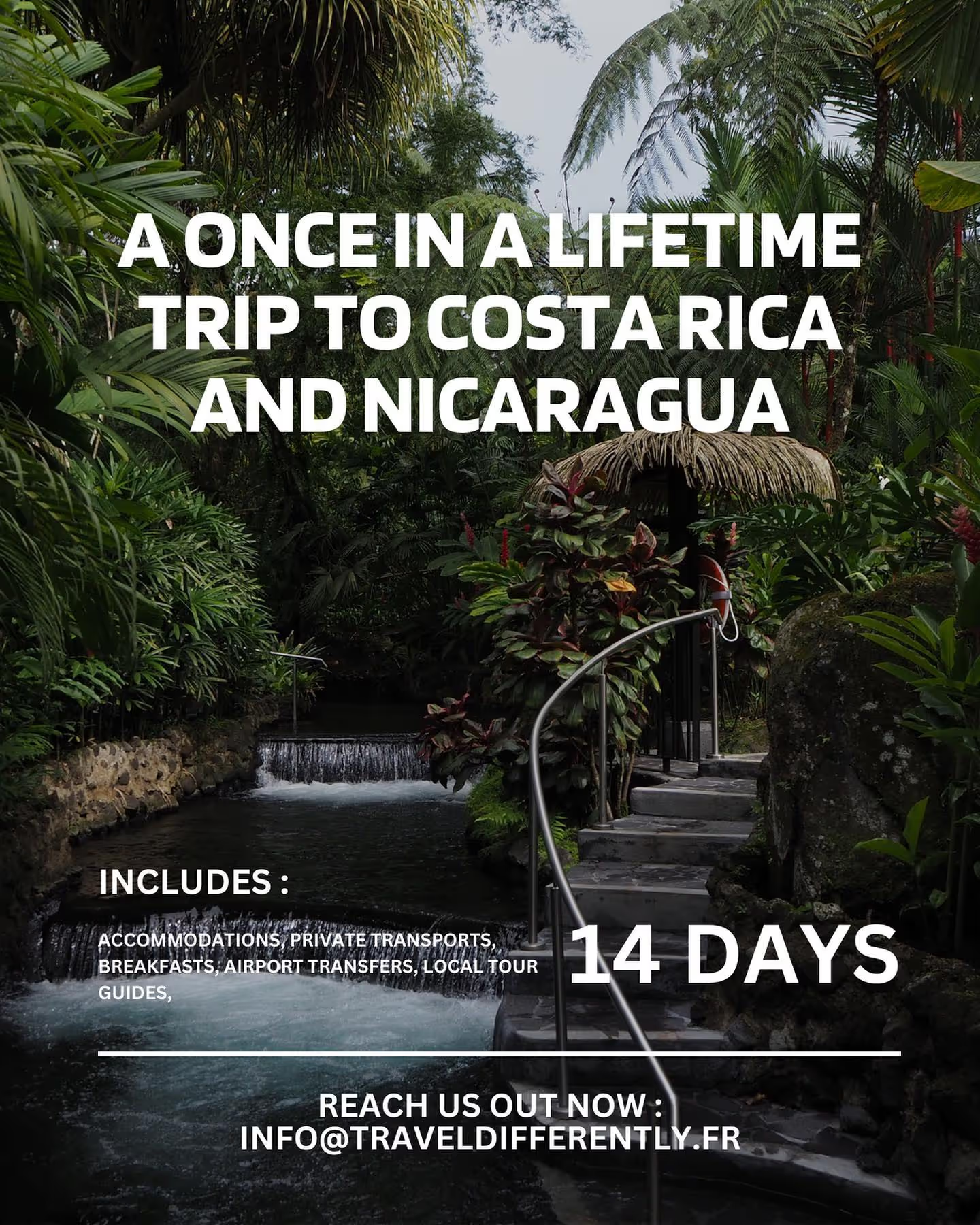Nous sommes devenus un monde globalisé et voyager n'a jamais été aussi facile, du moins avant la pandémie... Chaque année, les gens voyagent loin de chez eux principalement vers des destinations prisées qui souffrent désormais des effets du tourisme de masse.
Peut-être qu'avec la pandémie, les gens en chercheront plus des moyens durables voyager afin de réformer l'industrie du tourisme.
Nous savons que l'alternative au tourisme de masse est maintenant l'écotourisme, mais qu'est-ce que c'est ? Et pourquoi devrions-nous nous intéresser à l'écotourisme ?
1. Qu'est-ce que « » exactementécotourisme''?
Prenons 3 minutes pour comprendre »pourquoi devrions-nous nous intéresser à l'écotourisme ? » et »quels en sont les avantages ? »
En termes simples, écotourisme est défini comme suit : « Un voyage responsable vers des zones naturelles qui préserve l'environnement, préserve le bien-être de la population locale et implique des activités d'interprétation et d'éducation ».
Il s'agit d'un moyen de transport à faible impact qui préserve le monde naturel et protège sa biodiversité et les communautés locales. Les destinations écotouristiques sont généralement fragiles et assez préservées.
Les destinations écotouristiques sont souvent des environnements naturels remarquablement préservés et fragiles qui nécessitent une intervention humaine responsable. Vous trouverez d'excellents exemples de destinations écotouristiques dans notre 3 jours au Pérou et 5 jours d'aventure et d'écotourisme au Mexique expériences.
%252520(1)%252520(2).avif)
2. Maintenant, vous vous demandez peut-être : pourquoi devrions-nous nous intéresser à l'écotourisme ?
Parce que cela contribue réellement à préserver certains des plus beaux environnements de la planète à un niveau bien plus profond que ce que nous connaissons tous déjà.
Vous pouvez apporter votre contribution aux communautés locales et vous renseigner pour que plus nous en sachions sur le monde, mieux nous puissions le protéger pour les générations futures.
Est-ce que tu sais que écotourisme est différent de tourisme durable, on a souvent du mal à faire la distinction ! C'est pourquoi nous préférons vous l'expliquer !
%252520(1).avif)
3. Écotourisme contre tourisme durable
Écotourisme présente de nombreux avantages environnementaux, culturels et économiques pour les résidents. Mais écotourisme ne doit pas être confondu avec le tourisme de nature, qui consiste uniquement à visiter des attractions naturelles. Par exemple, dans le tourisme de nature, un touriste peut aller observer les oiseaux dans une région pittoresque, mais un écotouriste ira observer les oiseaux avec un guide local et séjournera dans un Ecolodge géré par la population locale, contribuant ainsi à l'économie locale.
Concentration :
- Écotourisme : l'écotourisme met l'accent sur la conservation écologique et l'éducation des touristes sur l'environnement local et la nature environnante
- Tourisme durable : Le tourisme durable tente de réduire les impacts négatifs du secteur du tourisme sur l'environnement et les communautés locales.
Destination :
- Écotourisme : L'écotourisme englobe différents types de destinations telles que la nature sauvage, les centres urbains et d'autres lieux de valeur culturelle.
- Tourisme durable : Le tourisme durable inclut souvent des destinations qui présentent des caractéristiques naturelles uniques, généralement des zones rurales et sauvages.
Types :
- Écotourisme : L'écotourisme est un type de tourisme.
- Tourisme durable : Le concept de durabilité peut être appliqué à toute forme de tourisme.
4. Comment fonctionne l'écotourisme ?
Écotourisme peut avoir un impact positif sur notre environnement s'il répond aux critères suivants :
- Minimise l'impact négatif du tourisme sur l'environnement.
- Sensibilise les touristes à la protection de l'environnement grâce à l'éducation à la nature.
- Fournit des revenus supplémentaires aux communautés locales, en promouvant l'appréciation locale et la protection de l'environnement.
- Contribue une partie des ressources financières du secteur du tourisme aux mesures de conservation de la nature.
L'une de nos expériences de voyage authentiques, le Forêt nuageuse, adhère pleinement à ces principes de l'écotourisme.

5. Quels sont les avantages des vacances écotouristiques ?

L'écotourisme présente de nombreux avantages, notamment :
- Éduquer les voyageurs — L'écotourisme sensibilise à l'environnement et encourage une action responsable grâce à des décisions éclairées.
- Soutenir les communautés locales — Choisir l'écotourisme, c'est contribuer aux économies locales plutôt qu'aux multinationales.
- Promouvoir des expériences de voyage plus approfondies — L'écotourisme vous permet de vous immerger dans la beauté naturelle, d'améliorer votre santé mentale et d'élargir votre perspective.
En plus de ces avantages, notre Vacances d'aventure en famille aux Galapagos offre une expérience inoubliable et responsable à toute la famille.
De plus, les passagers aériens peuvent compenser les émissions de leur vol, c'est ce que nous faisons avec notre « 1 voyageur, 2 arbres » programme. Notre engagement est simple : chaque fois qu'un voyageur réserve un voyage, nous minimisons son empreinte carbone en plantant 2 arbres. C'est l'une des actions que nous mettons en œuvre pour proposer un voyage plus conscient vers la planète et ses populations ! Notre objectif est de minimiser les impacts sociaux et environnementaux du tourisme.
Cependant, écotourisme dans sa forme idéale, elle ne peut fonctionner que si les aspects sociaux sont pris en compte en plus des aspects écologiques. Ce n'est que lorsque les avantages du tourisme persistent dans la région que l'incitation économique à protéger la précieuse nature existe.
En voici les principales :
A. Éduque les voyageurs
Comme nous l'avons déjà mentionné, écotourisme sensibilise le public aux menaces qui pèsent sur l'environnement, mais permet également aux gens de s'informer et d'apporter des changements, même minimes, pour faire une réelle différence. Tout part de la Connaissance.
B. Soutenir les communautés locales.
Écotourisme met l'accent sur la contribution aux marchés, aux entreprises et aux communautés locaux plutôt qu'aux grandes multinationales. Quand tu choisis écotourisme, vous contribuez aux moyens de subsistance des communautés locales.
C. Vivez une expérience de voyage plus approfondie.
Écotourisme vous donne l'occasion de vraiment vous arrêter, de regarder autour de vous et d'apprécier sa beauté naturelle. Il ne s'agit pas seulement de l'environnement, mais aussi de vous, car cela vous éduque, améliore votre santé mentale et vous rend plus ouvert d'esprit.
Des études ont montré que l'exposition aux environnements naturels contribue à améliorer notre santé psychologique et nous fait nous sentir bien.
D. Ne vaut-il pas mieux ne pas simplement ne pas voyager ?
Oui et non En fait, nous ne pouvons pas arrêter de voyager dans d'autres pays parce que nous sommes maintenant trop curieux de découvrir d'autres cultures, d'autres communautés et il faut beaucoup de courage pour rester dans un pays juste pour ne pas émettre de gaz à effet de serre. Il s'agit de trouver un équilibre, et c'est exactement cela. écotourisme fait.
En choisissant écotourisme, vous évitez le tourisme de masse au profit d'une expérience qui redonne à la planète et aux communautés locales.
6. Où partir pour vivre une expérience écotouristique mémorable ?
L'écotourisme a gagné en popularité ces dernières années, car de plus en plus de voyageurs recherchent des moyens durables et responsables d'explorer la beauté naturelle de notre planète. Voici quelques destinations écotouristiques remarquables à travers le monde :
- Costa Rica : Le Costa Rica, souvent abordé dans les discussions sur voyage authentique, est une destination écotouristique bien connue. Son paysage tropical comprend des forêts tropicales, des forêts nuageuses, d'innombrables plages, des volcans et des montagnes. Les visiteurs peuvent explorer la faune unique du Costa Rica, s'imprégner du mode de vie local « pura vida » et même embarquer pour une voyage unique au Costa Rica et au Nicaragua pour une expérience réellement immersive.
- Kénya : À titre d'excellent exemple d'écotourisme en Afrique, le gouvernement du Kenya a créé « Ecotourism Kenya » pour promouvoir un tourisme durable qui préserve l'environnement naturel du pays et améliore la vie des communautés locales.
- Îles Galapagos : En tant que site du patrimoine mondial de l'UNESCO et destination écotouristique populaire, les îles Galapagos, Vacances d'aventure en famille aux Galapagos peut offrir une rencontre unique avec la faune des îles, notamment les tortues géantes, les iguanes marins et les fous à pieds bleus.
- Norvège : Connue pour ses fjords, ses glaciers et ses montagnes à couper le souffle, la Norvège fait également preuve d'un engagement ferme en faveur de la durabilité et des pratiques respectueuses de l'environnement, ce qui en fait un choix de premier choix pour les voyageurs soucieux de l'environnement.
- Islande : Destination idéale pour l'écotourisme, l'Islande propose à ses visiteurs des piscines géothermiques, des glaciers et des cascades. Son engagement en faveur d'un tourisme durable et de pratiques respectueuses de l'environnement est bien connu et applaudi.
- Forêt amazonienne : En tant que plus grande forêt tropicale du monde, l'Amazonie est une destination écotouristique clé. L'écotourisme contribue non seulement à sensibiliser les gens à l'importance mondiale de cette immense forêt tropicale, mais génère également des revenus essentiels pour les communautés locales. Pour une expérience immersive, pensez à écotourisme au Brésil : 5 jours dans la forêt amazonienne.
- Bhoutan : Petit pays de l'Himalaya, le Bhoutan donne la priorité à la durabilité et aux pratiques respectueuses de l'environnement dans le cadre de sa politique unique de « bonheur national brut ».
- Palaos : Ce petit pays insulaire du Pacifique applique des réglementations strictes pour protéger son environnement marin, notamment en créant le premier sanctuaire de requins au monde. Leur engagement en faveur de la durabilité fait des Palaos un lieu d'écotourisme de premier ordre.
7. Choisir le bon opérateur d'écotourisme : un guide pour des voyages durables
Le choix d'un opérateur d'écotourisme responsable est essentiel pour garantir que vos activités touristiques ont un impact minimal sur l'environnement et contribuent de manière positive aux communautés locales. Voici comment vous pouvez prendre une décision plus éclairée :
- Vérifiez les certifications et les accréditations : Recherchez les labels d'approbation d'organisations telles que le Conseil mondial du tourisme durable (GSTC) ou la Rainforest Alliance, qui indiquent que l'opérateur suit des pratiques responsables et durables.
- Lire les avis : Prenez le temps de lire critiques et témoignages de clients précédents. Ils peuvent permettre de savoir si l'opérateur pratique réellement un tourisme durable.
- Politiques relatives aux opérateurs de recherche : Découvrez les politiques et les pratiques de l'opérateur en matière de conservation de l'environnement, d'engagement communautaire et de préservation culturelle. Les bons opérateurs auront ces politiques clairement énoncées.
- Engagement de l'exploitant en matière de conservation : Un autre élément à prendre en compte est de savoir si l'opérateur est impliqué dans des projets locaux de conservation et de développement communautaire. Un opérateur responsable devrait avoir un impact positif sur les destinations qu'il dessert. L'écotourisme au Mexique : le côté authentique de la Riviera Maya est un exemple d'opérateur qui contribue à la préservation de la destination.
- Embauchez et formez des guides locaux : Les opérateurs qui recrutent et forment des guides et du personnel locaux offrent non seulement des opportunités d'emploi dans les communautés locales, mais proposent également aux touristes des expériences culturelles authentiques. Dans Les incontournables du Pérou en un clin d'œil, des guides locaux offrent un aperçu approfondi de la culture et du patrimoine péruviens.
- Impact environnemental : Un autre facteur important est l'engagement de l'opérateur à minimiser son impact environnemental. Recherchez des opérateurs qui utilisent des sources d'énergie renouvelables ou qui ont mis en œuvre des programmes de réduction des déchets, comme le Lodge écologique de luxe en Équateur, qui est nichée au cœur de la forêt tropicale et applique des pratiques durables.
- General Engagement : Tenez compte de l'engagement global de l'opérateur en faveur d'un tourisme responsable, au-delà de ses offres d'écotourisme. Vous devez évaluer leurs pratiques et politiques de durabilité dans leur ensemble. Points forts de la tournée en Équateur et en Colombie montre à quel point une visite peut être passionnante et responsable à la fois.
- Posez des questions : Enfin, n'hésitez pas à poser des questions à l'opérateur sur ses pratiques et ses politiques, par exemple sur la manière dont il garantit le bien-être des communautés locales et de l'environnement. Plus ils font preuve de transparence dans leurs activités, plus vous pouvez avoir confiance en eux en tant qu'opérateur écotouristique responsable.
En prenant le temps de faire ces recherches, vous pouvez vous assurer de soutenir les opérateurs qui font une réelle différence dans le monde. Le tourisme responsable est un puissant outil de changement positif, et chaque décision que vous prenez peut contribuer à y contribuer. Pour plus de conseils pour devenir un touriste plus responsable, consultez 9 étapes pour devenir un voyageur plus durable.
6. Pour conclure
Le tourisme peut être à la fois une bénédiction et une malédiction pour les destinations touristiques les plus prisées. D'une part, cette industrie lucrative crée des emplois et des opportunités pour les citoyens, d'autre part, elle a également des conséquences négatives qui accablent souvent les habitants : intolérance culturelle, concurrence croissante au sein de la population, déchets et bruit.
« Le tourisme détruit ce qu'il cherche en le trouvant. » (Hans Magnus Enzensberger)
Soi-disant écotourisme devrait représenter une alternative limitée, sensible et durable au tourisme de masse. Mais écotourisme est interprété de manière très différente. La proximité de la nature est au premier plan de cette forme de tourisme, mais sa gestion écologiquement durable varie considérablement dans la pratique. Pour de nombreux prestataires, les demandes des touristes passent avant tout, de sorte que la protection de la nature et des animaux est trop souvent subordonnée aux besoins des touristes. En général, la demande critique en matière de durabilité et de protection de l'environnement est très importante à cet égard afin d'établir une stratégie de plus en plus verte parmi les fournisseurs. Dans ce contexte, certains prestataires touristiques sont souvent accusés de fraude en matière de labels et de blanchiment écologique.
Bien entendu, un tourisme limité et exclusif dans un établissement privé géré par une entreprise familiale locale correspond davantage à la compréhension de écotourisme que le complexe hôtelier cinq étoiles international. Néanmoins, il est important que l'aspect de la durabilité soit intégré à toutes les formes de tourisme, que ce soit dans les grandes villes ou dans les zones naturelles, afin que, notamment, les exigences critiques des touristes incitent les fournisseurs à faire plus que simplement passer à des lampes à économie d'énergie. Pour l'exclusivité écotourisme dans les zones proches de la nature, cela signifie généralement que l'empreinte touristique doit être aussi faible que possible.
Maintenant, tu sais pourquoi devrions-nous nous intéresser à l'écotourisme et quels sont les avantages pour une meilleure industrie du voyage ! 👏😍 Mais êtes-vous au courant de 6 mythes sur le tourisme durable ? 🤔
{{component-create-my-trip= »/"}}






-min.avif)

.avif)
%2520(1).avif)












%201.svg)

